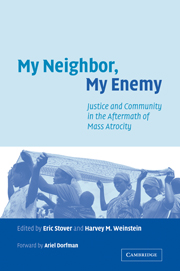Book contents
- Frontmatter
- Contents
- List of contributors
- Foreword by Ariel Dorfman
- Acknowledgments
- Introduction: conflict, justice and reclamation
- Part I Institutional approaches to justice
- 1 A world unto itself? The application of international justice in the former Yugoslavia
- 2 Legal responses to genocide in Rwanda
- 3 Localizing justice: gacaca courts in post-genocide Rwanda
- 4 Exhumation of mass graves: balancing legal and humanitarian needs
- 5 Witnesses and the promise of justice in The Hague
- 6 Reparations in the aftermath of repression and mass violence
- Part II Social reconstruction and justice
- Part III Survivors and justice
- Conclusion: a common objective, a universe of alternatives
- Index
1 - A world unto itself? The application of international justice in the former Yugoslavia
Published online by Cambridge University Press: 05 May 2010
- Frontmatter
- Contents
- List of contributors
- Foreword by Ariel Dorfman
- Acknowledgments
- Introduction: conflict, justice and reclamation
- Part I Institutional approaches to justice
- 1 A world unto itself? The application of international justice in the former Yugoslavia
- 2 Legal responses to genocide in Rwanda
- 3 Localizing justice: gacaca courts in post-genocide Rwanda
- 4 Exhumation of mass graves: balancing legal and humanitarian needs
- 5 Witnesses and the promise of justice in The Hague
- 6 Reparations in the aftermath of repression and mass violence
- Part II Social reconstruction and justice
- Part III Survivors and justice
- Conclusion: a common objective, a universe of alternatives
- Index
Summary
In the summer of 1992, the contrast between images of emaciated, half-naked Bosniak men, baking behind barbed wire under a relentless sun at the Serb-controlled Omarska prison camp in north/central Bosnia and Herzegovina (BiH), and photographs of well-dressed, well-fed diplomats speaking with reporters outside the United Nations (UN) in New York about the Balkan conflict could not have been more stark. Yet the link between the powerless and powerful became palpable and assumed a distinct legal form when the UN Security Council created the International Criminal Tribunal for the former Yugoslavia (ICTY) in May 1993. Its formation would be critical for those immediately affected by the war and serve as a harbinger of politics in the post-Cold War world. In fact, its creation turned out to be a watershed event that has altered dramatically the landscape of post-conflict interventions.
As demonstrated by the proliferation of war crimes tribunals and other institutional responses to war crimes in Rwanda, Sierra Leone, East Timor, and Kosovo, the question is no longer whether there should be accountability for mass violence, but what form it should take. There has been much debate about the relative merits of trials, truth commissions, or other forms of reckoning such as lustration (the wholesale firing from government positions of those who served under a repressive regime). Those who study how countries might best confront the human rights abuses of a prior regime propose an array of options, yet the events of the last decade suggest that trials, with international involvement, are the preferred response.
- Type
- Chapter
- Information
- My Neighbor, My EnemyJustice and Community in the Aftermath of Mass Atrocity, pp. 29 - 48Publisher: Cambridge University PressPrint publication year: 2004
- 17
- Cited by



